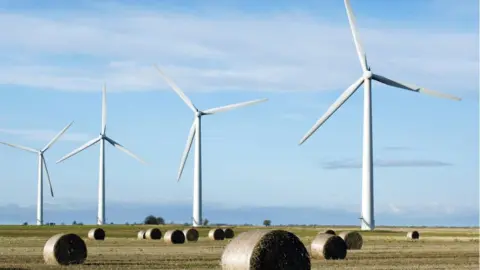Senior Tories back move to end onshore wind ban
 Getty Images
Getty ImagesEx-Prime Minister Liz Truss is among more than 20 Conservative MPs backing an attempt to overturn the de-facto ban on new onshore wind farms in England.
Former COP26 president Sir Alok Sharma is leading the move to force the government to ease restrictions.
Last year, ministers pledged to relax the rules by the end of April after a threatened rebellion from Tory MPs.
The government said it backed the development of onshore wind where there was local support.
Prime Minister Rishi Sunak now faces a fresh challenge over the issue, which divides Conservative MPs, after seeing off last year's rebellion.
Sir Alok has tabled an amendment to the Energy Bill which would remove current planning restrictions in England meaning a single objection to an onshore wind development could lead to it being blocked.
It would also ensure local communities willing to host turbines would receive direct benefits and that local decisions made on onshore wind cannot be overturned on appeal.
The bill is due to return to the Commons after the summer recess.
Ms Truss's former Levelling Up Minister Sir Simon Clarke, who led last year's rebellion on the issue, is among those supporting the latest move, alongside former party chairman Sir Jake Berry, former chief whip Wendy Morton and former minister Stephen Crabb.
Tory peer Lord Goldsmith, who resigned from the government last month accusing Mr Sunak of "apathy" over climate change, also expressed support for the amendment on Twitter.
However, other Tories have opposed onshore wind developments in their areas because of the impact on local residents and landscapes.
Sir Alok said: "Last autumn the government committed to change the planning rules by the end of April this year to overturn the de-facto ban on onshore wind. Unfortunately, this has not happened.
"This amendment will help to deliver on the government's own promise to unlock investment in one of the cheapest forms of energy. Ultimately this will bring down household bills and improve our energy security."
A consultation on relaxing planning restrictions closed in March but the government's response is not expected to be published until the autumn.
The proposals, which included relaxing a requirement for turbines to be built on pre-designated land, were criticised by the renewable energy industry as not going far enough.
The current rules, introduced under David Cameron in 2015, mean an objection from just one person over an onshore wind development in England could stop it going ahead.
Trade body RenewableUK said this could still be the case under the government's proposals.
The government is also consulting on plans to allow communities in England who want to host wind farms to directly benefit from them, for example through energy bill discounts.
A government spokesperson said: "We support the development of onshore wind where there is local support, recognising it as an efficient, low-cost and a widely supported source of energy, while being a key part of helping reduce the UK's reliance on importing expensive, foreign fossil fuels.
"We consulted on changes to national planning policy that could give local authorities more flexibility to respond to the views of their communities, and to demonstrate their support for areas suitable for onshore wind proposals."
